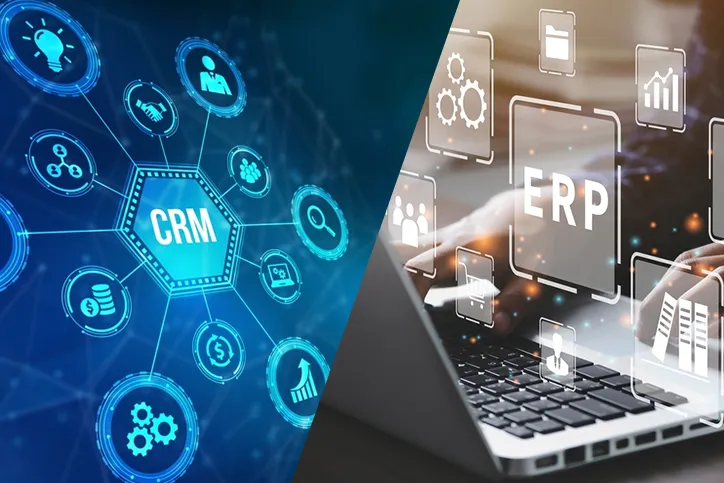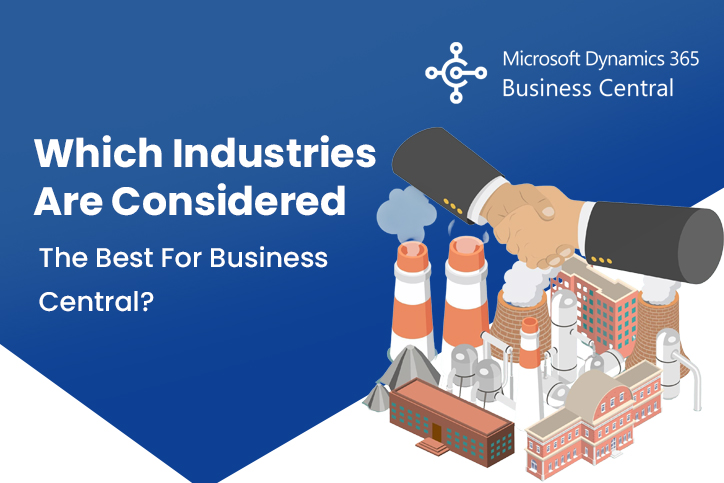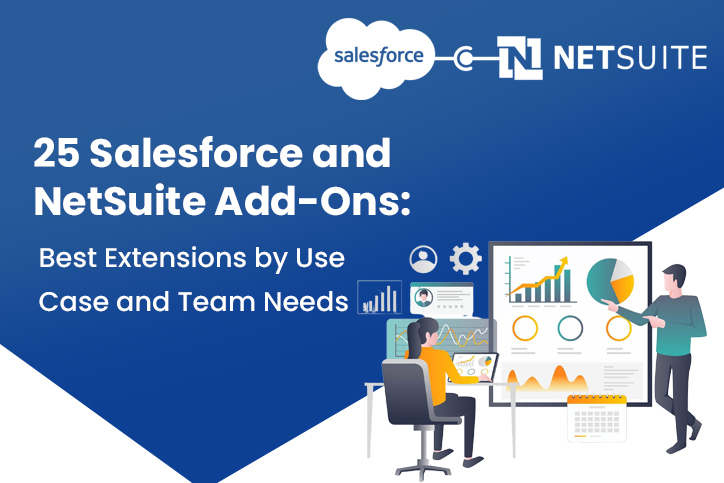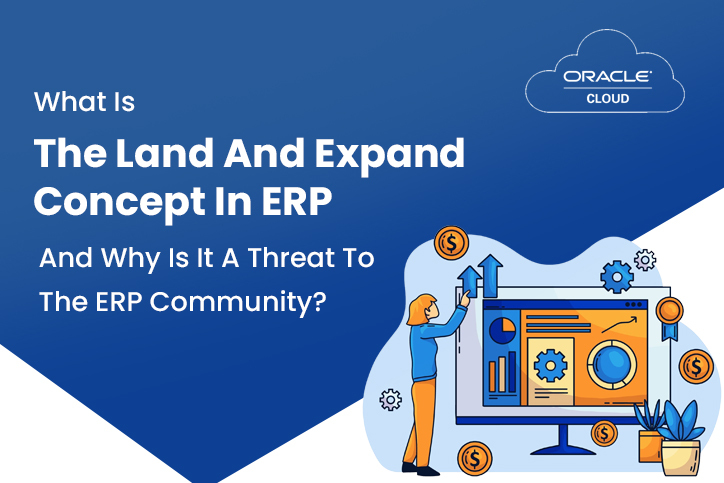Dynamics 365 is a suite of cloud-based business applications from Microsoft that helps organizations streamline their business processes and improve productivity. Dynamics 365 includes two main components: Customer Relationship Management (CRM) and Enterprise Resource Planning (ERP). Both CRM and ERP are designed to help organizations manage their operations more efficiently and effectively. However, there are some key differences between the two. In this article, we will explore the key differences and benefits of Dynamics 365 CRM vs ERP and help you choose the right solution for your business
Introduction to Dynamics 365 CRM and ERP
Dynamics 365 CRM is a customer relationship management tool that helps organizations manage their interactions with customers and prospects. It provides a 360-degree view of customer interactions and enables organizations to track customer interactions across multiple channels, including email, phone, and social media. Dynamics 365 CRM also includes sales automation, marketing automation, and customer service management features.
Dynamics 365 ERP, on the other hand, is an enterprise resource planning tool that helps organizations manage their financials, inventory, supply chain, and other core business processes. It enables organizations to automate business processes, reduce manual data entry, and improve accuracy. Dynamics 365 ERP includes modules for finance, supply chain management, human resources, and project management
Understanding CRM (Customer Relationship Management)
As mentioned earlier, Dynamics 365 CRM is a customer relationship management tool that helps organizations manage their interactions with customers and prospects. The following are six key features and benefits of Dynamics 365 CRM:
- Sales automation: Dynamics 365 CRM enables organizations to automate their sales processes, from lead generation to deal closure. It provides sales teams with tools to manage their leads, opportunities, and contacts, as well as track their progress through the sales pipeline.
- Marketing automation: Dynamics 365 CRM includes marketing automation features that enable organizations to create and manage marketing campaigns across multiple channels, including email, social media, and web.
- Customer service management: Dynamics 365 CRM includes customer service management features that enable organizations to manage customer inquiries and support requests. It provides a 360-degree view of customer interactions and enables organizations to track customer interactions across multiple channels.
- Collaboration: Dynamics 365 CRM includes collaboration features that enable teams to work together more effectively. It provides tools for sharing documents, managing tasks, and communicating with team members.
- Mobile access: Dynamics 365 CRM is accessible from any device, including smartphones and tablets. This enables sales teams to access customer information and update their records while on the go.
- Analytics and reporting: Dynamics 365 CRM includes analytics and reporting features that enable organizations to track their performance and identify areas for improvement. It provides dashboards and reports that enable organizations to monitor their sales pipeline, customer service metrics, and marketing campaign performance.
Understanding ERP (Enterprise Resource Planning)
Dynamics 365 ERP is an enterprise resource planning tool that helps organizations manage their financials, inventory, supply chain, and other core business processes. The following are six key features and benefits of Dynamics 365 ERP:
- Financial management: Dynamics 365 ERP includes financial management features that enable organizations to manage their financials more efficiently. It provides tools for managing accounts payable, accounts receivable, and general ledger, as well as financial reporting.
- Supply chain management: Dynamics 365 ERP includes supply chain management features that enable organizations to manage their inventory, procurement, and logistics more effectively. It provides tools for managing purchase orders, sales orders, and inventory levels.
- Human resources management: Dynamics 365 ERP includes human resources management features that enable organizations to manage their workforce more effectively. It provides tools for managing employee records, benefits, and payroll.
- Project management: Dynamics 365 ERP includes project management features that enable organizations to manage their projects more effectively. It provides tools for managing project budgets, timelines, and resources.
- Manufacturing: Dynamics 365 ERP is manufacturing features that enable organizations to manage their production processes more efficiently. It provides tools for managing bills of materials, production orders, and capacity planning.
- Analytics and reporting: Dynamics 365 ERP includes analytics and reporting features that enable organizations to monitor their performance and identify areas for improvement. It provides dashboards and reports that enable organizations to monitor their financial performance, inventory levels, and project status
Differences between Dynamics 365 CRM and ERP
The following table summarizes the key differences between Dynamics 365 CRM and ERP:
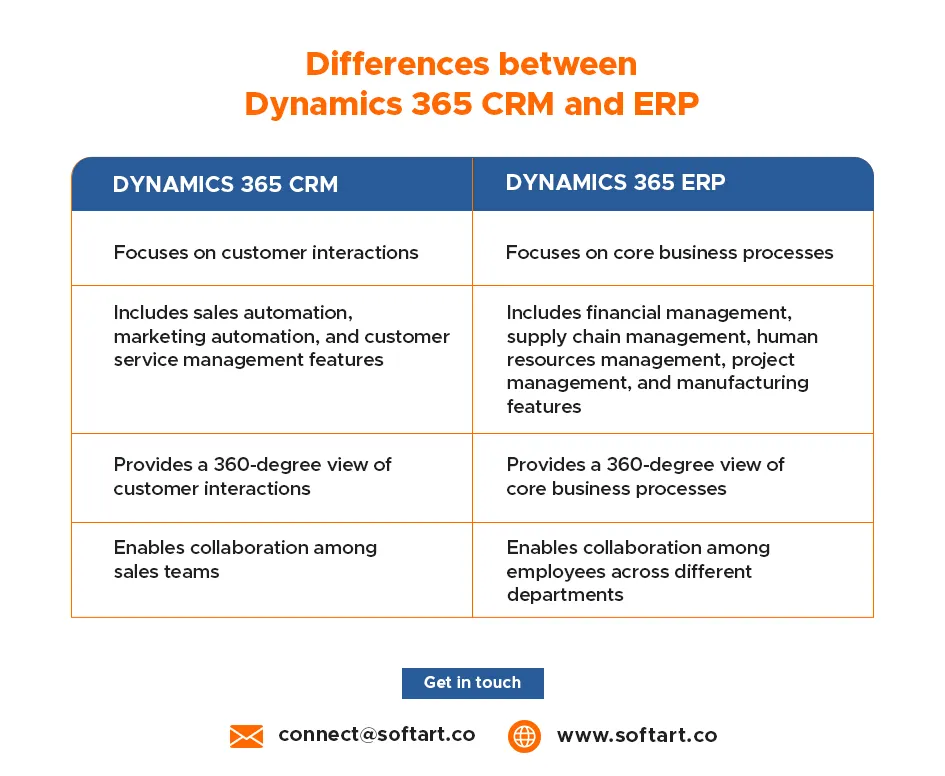
Choosing the right solution for your business with SoftArt – Your Trusted ERP Partner
Choosing the right solution for your business can be a daunting task. That’s why it’s important to work with a trusted partner like SoftArt. SoftArt is a Microsoft Gold Certified Partner that specializes in Dynamics 365 implementation and support. We have the expertise and experience to help you choose the right solution for your business and ensure a smooth implementation.
Whether you need Dynamics 365 CRM, ERP, or both, SoftArt can help. We offer a range of services, including implementation, customization, training, and support. We can also help you integrate Dynamics 365 with other business applications to streamline your operations and improve productivity.
In conclusion, Dynamics 365 CRM and ERP are powerful tools that can help organizations manage their operations more efficiently and effectively. While both solutions share some similarities, they are designed to address different business needs. By understanding the key differences and benefits of Dynamics 365 CRM vs ERP, you can choose the right solution for your business and achieve your goals. Contact SoftArt today to learn more about how we can help you leverage Dynamics 365 to drive business growth.




